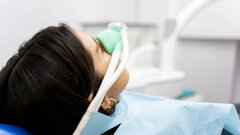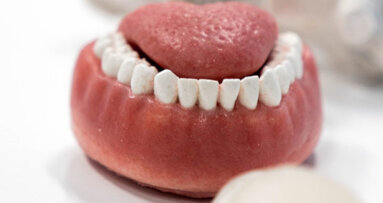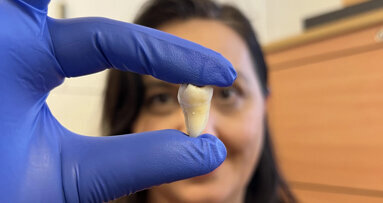SHEFFIELD, UK: For sufferers of dental anxiety, the fear of dental procedures and check-ups can often lead to neglect of oral care, poorer dental health, and a sense of depression or shame. A new study conducted by researchers at the University of Sheffield has looked into the efficacy of cognitive behavioural therapy (CBT) as a means of addressing dental anxiety in children, over one-third of whom experience such fear, and achieved good results.
In the study, the researchers aimed to develop a guided self-help CBT resource to reduce dental anxiety in children. This fear can prevent children from receiving important dental care, so understanding the root of the issue is an important step in seeking to address the problem. Interestingly, research recently conducted in the US has found that dental anxiety may not only be caused by environmental factors, but also be a result of genetic influences. Irrespective of the aetiology, reducing the fear of dental visits in children is a valuable corrective action that can ideally lead to lifelong healthy dental habits.
In the first phase of the study, a qualitative approach was utilised to guide the development of the resource. The second phase involved children between the ages of 9 and 16 who suffered from dental anxiety being asked to trial the CBT resource. Available in hard copy or online, the CBT resource allowed a variety of techniques and tools to be employed by the children. These included squeezing a stress ball, writing a message to the dentist and choosing a small reward. The children’s relative levels of dental anxiety were assessed through the completion of questionnaires prior to and after using the resource.
In addition, the feasibility of this resource for children was analysed through a combination of interviews and focus groups with children, parents and caregivers, as well as dental professionals. The researchers found that the use of the CBT resource resulted in 60 per cent of the children feeling less worried about visiting the dentist. Additionally, the participating children were found to have a corresponding increase in health-related quality of life after their use of the CBT resource. The study findings will be employed in the development of a more definitive trial to investigate the treatment success and cost-effectiveness of this resource.
The study, titled “Development and testing of a cognitive behavioral therapy resource for children’s dental anxiety”, was published online on 1 November in JDR Clinical and Translational Research.
LEEDS, England: While antibiotics remain essential for treating infectious diseases, their global efficacy is declining owing to the rise of antimicrobial ...
LONDON, England: The current state of public health dentistry in the UK is, without question, lamentable. Plagued by financial, personnel and regulatory ...
YORK, UK: Fear of the dentist is something some people suffer from more than others. With multiple reasons for dental anxiety and its effects, there is ...
LONDON, UK: Teeth in this day and age are constantly under attack. While sugar has been considered to do the most harm to our pearly whites, a new concern ...
NEWCASTLE UPON TYNE – Biofilms are increasingly recognised as an important issue in dental and health care, as they can cause dental plaque, sinusitis...
LEEDS, England: A new study exploring the disparities in access to National Health Service (NHS) dental care across different neighbourhoods in England has ...
MANCHESTER, UK: In the Greater Manchester region, the most common reason for young children being admitted to hospital is to have a tooth removed. In ...
BIRMINGHAM, UK: New research being carried out in collaboration with the University of Birmingham will allow dental students to train on dental models that ...
LONDON, England: Previous research has shown that, when combined, dental epithelial and mesenchymal cells can form tooth-like structures in vitro called ...
LONDON, UK: Coinciding with World Oral Health Day, Swedish brand FOREO, makers of the world's first electric toothbrush made entirely from silicone, ...
Live webinar
Tue. 24 February 2026
6:00 pm UTC (London)
Prof. Dr. Markus B. Hürzeler
Live webinar
Tue. 24 February 2026
8:00 pm UTC (London)
Prof. Dr. Marcel A. Wainwright DDS, PhD
Live webinar
Wed. 25 February 2026
4:00 pm UTC (London)
Prof. Dr. Daniel Edelhoff
Live webinar
Wed. 25 February 2026
6:00 pm UTC (London)
Live webinar
Thu. 26 February 2026
1:00 am UTC (London)
Live webinar
Tue. 3 March 2026
4:00 pm UTC (London)
Dr. Omar Lugo Cirujano Maxilofacial
Live webinar
Wed. 4 March 2026
1:00 am UTC (London)
Dr. Vasiliki Maseli DDS, MS, EdM



 Austria / Österreich
Austria / Österreich
 Bosnia and Herzegovina / Босна и Херцеговина
Bosnia and Herzegovina / Босна и Херцеговина
 Bulgaria / България
Bulgaria / България
 Croatia / Hrvatska
Croatia / Hrvatska
 Czech Republic & Slovakia / Česká republika & Slovensko
Czech Republic & Slovakia / Česká republika & Slovensko
 France / France
France / France
 Germany / Deutschland
Germany / Deutschland
 Greece / ΕΛΛΑΔΑ
Greece / ΕΛΛΑΔΑ
 Hungary / Hungary
Hungary / Hungary
 Italy / Italia
Italy / Italia
 Netherlands / Nederland
Netherlands / Nederland
 Nordic / Nordic
Nordic / Nordic
 Poland / Polska
Poland / Polska
 Portugal / Portugal
Portugal / Portugal
 Romania & Moldova / România & Moldova
Romania & Moldova / România & Moldova
 Slovenia / Slovenija
Slovenia / Slovenija
 Serbia & Montenegro / Србија и Црна Гора
Serbia & Montenegro / Србија и Црна Гора
 Spain / España
Spain / España
 Switzerland / Schweiz
Switzerland / Schweiz
 Turkey / Türkiye
Turkey / Türkiye
 UK & Ireland / UK & Ireland
UK & Ireland / UK & Ireland
 International / International
International / International
 Brazil / Brasil
Brazil / Brasil
 Canada / Canada
Canada / Canada
 Latin America / Latinoamérica
Latin America / Latinoamérica
 USA / USA
USA / USA
 China / 中国
China / 中国
 India / भारत गणराज्य
India / भारत गणराज्य
 Pakistan / Pākistān
Pakistan / Pākistān
 Vietnam / Việt Nam
Vietnam / Việt Nam
 ASEAN / ASEAN
ASEAN / ASEAN
 Israel / מְדִינַת יִשְׂרָאֵל
Israel / מְדִינַת יִשְׂרָאֵל
 Algeria, Morocco & Tunisia / الجزائر والمغرب وتونس
Algeria, Morocco & Tunisia / الجزائر والمغرب وتونس
 Middle East / Middle East
Middle East / Middle East


















































To post a reply please login or register